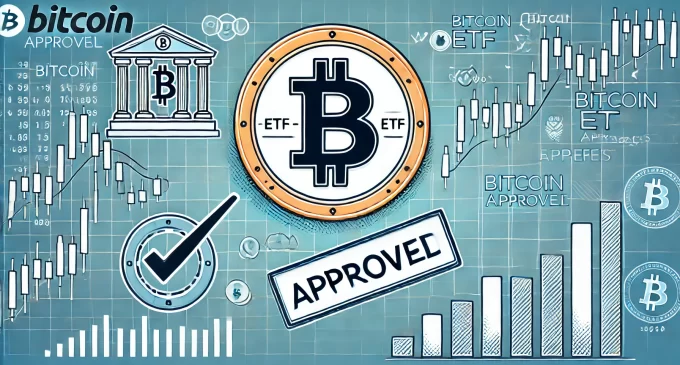
Introduction
The cryptocurrency market has witnessed a landmark event with the U.S. Securities and Exchange Commission (SEC) approving a new Bitcoin Exchange-Traded Fund (ETF) on July 31, 2024. This approval is a significant milestone, expected to attract a broader range of investors and enhance the liquidity of the market. The introduction of a Bitcoin ETF marks a new era in the cryptocurrency landscape, bridging the gap between traditional finance and the burgeoning digital asset sector.
What Is A Bitcoin ETF?
An ETF, or Exchange-Traded Fund, is a type of investment fund and exchange-traded product, meaning it is traded on stock exchanges. ETFs are similar in many ways to mutual funds; however, they are traded more like a common stock. A Bitcoin ETF, therefore, allows investors to buy shares that represent a fixed amount of Bitcoin, without the need to directly purchase and store the cryptocurrency itself.
Historical Context And Previous Attempts
The journey to SEC approval for Bitcoin ETFs has been long and fraught with challenges. Numerous applications have been submitted over the years, with the SEC rejecting each one due to concerns over market manipulation, liquidity, and the overall security of the underlying assets. The first significant attempt was made by the Winklevoss twins in 2013, but it was not until recently that the regulatory environment began to change favorably.
The Significance Of SEC Approval
The SEC’s approval of a Bitcoin ETF is monumental for several reasons:
Increased Accessibility: By offering a Bitcoin ETF, the market becomes accessible to a broader range of investors, including those who are not comfortable or familiar with purchasing cryptocurrencies directly. This democratization of access is likely to bring a significant influx of capital into the market.
Enhanced Market Liquidity: ETFs are known for their liquidity, and a Bitcoin ETF is no different. It allows for easier trading and the ability to quickly enter and exit positions, which is essential for institutional investors and traders.
Regulatory Confidence: SEC approval lends a sense of legitimacy and regulatory confidence to Bitcoin and the broader cryptocurrency market. This move can alleviate some of the skepticism and concerns held by traditional investors and financial institutions.
Potential for Market Growth: With greater accessibility and increased liquidity, the approval of a Bitcoin ETF is likely to contribute to the growth and stabilization of the cryptocurrency market. This could lead to more mainstream adoption and integration of digital assets into the global financial system.
Impact On The Cryptocurrency Market
Short-term Effects
In the immediate aftermath of the announcement, the price of Bitcoin saw a significant surge, reflecting the market’s optimism. This spike in price is expected to continue as more investors look to gain exposure to Bitcoin through the ETF. Other cryptocurrencies may also experience a positive ripple effect, as confidence in the digital asset market as a whole is bolstered.
Long-term Implications
Over the long term, the introduction of a Bitcoin ETF could lead to more sophisticated financial products and services built around cryptocurrencies. This includes the potential for other cryptocurrency ETFs, diversified digital asset funds, and more complex derivatives.
Investor Sentiment And Market Reaction
The reaction from investors has been overwhelmingly positive. Many see the SEC’s approval as a turning point for Bitcoin and the broader cryptocurrency market. Traditional financial institutions, which have been cautiously optimistic about digital assets, are now more likely to consider adding Bitcoin ETFs to their portfolios.
Institutional investors, in particular, are poised to benefit from the enhanced liquidity and regulatory oversight that comes with a Bitcoin ETF. This move could also pave the way for greater participation from pension funds, endowments, and other large-scale investors who have, until now, remained on the sidelines.
Challenges And Considerations
While the approval of a Bitcoin ETF is a significant step forward, it is not without its challenges. Market participants must remain vigilant about potential issues such as market manipulation, security vulnerabilities, and regulatory changes.
Market Manipulation
One of the primary concerns for the SEC has been the potential for market manipulation. The approval process has included rigorous assessments of market surveillance and fraud prevention mechanisms to mitigate these risks.
Security and Custody
Ensuring the security of the underlying Bitcoin assets is crucial. ETF providers must implement robust custody solutions to protect against theft and hacking. This includes using insured custodial services and cold storage solutions.
Regulatory Environment
The regulatory environment for cryptocurrencies is still evolving. Future regulatory changes, both in the U.S. and globally, could impact the operation and success of Bitcoin ETFs. Continuous engagement with regulators and adherence to compliance standards will be essential.
Conclusion
The SEC’s approval of a new Bitcoin ETF marks a pivotal moment in the history of cryptocurrencies. It symbolizes the growing acceptance and integration of digital assets into the mainstream financial system. By making Bitcoin more accessible to a broader range of investors and enhancing market liquidity, this move has the potential to drive significant growth and innovation in the cryptocurrency market.
As the market reacts and adapts to this new development, stakeholders must remain aware of the challenges and work collaboratively to ensure the continued growth and stability of the digital asset ecosystem. The future of Bitcoin and cryptocurrencies looks brighter than ever, with the SEC’s approval serving as a beacon of legitimacy and opportunity.







There are no comments at the moment, do you want to add one?
Write a comment